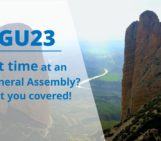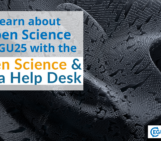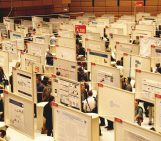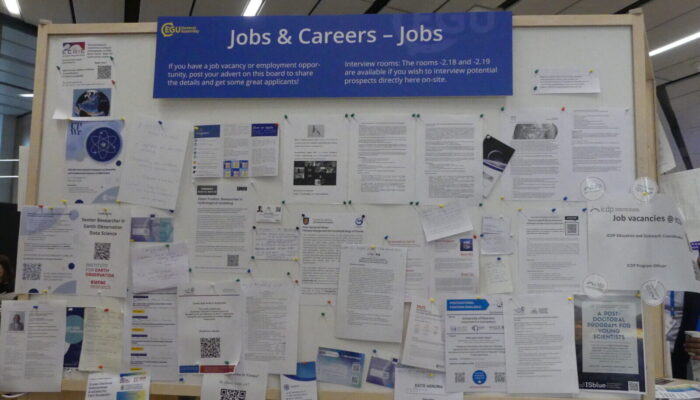
Attending conferences is a great way to widen your existing network, meet potential employers and grow your professional skills. At EGU25, there are lots of exciting and useful career networking opportunities, training and events, regardless of whether you attend virtually or on-site in Vienna!
Short Courses
SC 2.4 Navigating Your Path to Mid-Career: How to become a supervisor
Mon, 28 Apr, 10:45–12:30 (CEST) Room -2.82 (Purple level)
As your scientific career evolves, you may find yourself stepping into the pivotal role of an advisor or supervisor. This short course is designed to explore effective supervision practices and foster a healthy and balanced approach to supervision. Topics will include encouraging professional growth and independence, maintaining a healthy work-life balance, and integrating mindfulness and well-being practices in supervision.
SC 2.6 Invited to interview? Prepare for success with job applications and interviews in industry and academia
Mon, 28 Apr, 16:15–18:00 (CEST) Room -2.62 (Purple level)
The job market in both industry and academia can be a very challenging environment, especially for those either just completing a course of study, or looking to change sectors. This short course aims to bridge this gap to employment by drawing on the experience of senior career workers in both industry and academia, as well as HR professionals, to provide specific advice for anyone who is in the process of submitting a job application or preparing for interview.
SC 2.2 Mind your head: How to take time off in the academic world?
Tue, 29 Apr, 08:30–10:15 (CEST) Room -2.82 (Purple level)
Taking time off (e.g. while being on vacation) in academia poses several challenges, often due to the pressures of maintaining productivity in a highly competitive environment. Academic work is typically characterized by flexible but demanding schedules, making it difficult to fully disconnect during time off. Researchers often face the expectation of continuous output, leading to guilt or anxiety when taking breaks. In this short course, geoscientists from different career stages will talk about their experiences in taking time off.
SC 1.9 Being a scientist in the age of AI: Navigating tools, ethics, and challenges
Tue, 29 Apr, 19:00–20:00 (CEST) Room -2.62 (Purple level)
This short course we will address the increasing role of artificial intelligence (AI) in geoscientific research, guiding participants through the various stages of the research process where AI tools can be effectively implemented, however with responsibility. Additionally, the course aims to provoke reflections on the ethical implications of AI use, addressing concerns such as data bias, transparency, and the potential for misuse.
SC 2.10 European Research Council (ERC) Funding Opportunities
Tue, 29 Apr, 19:00–20:00 (CEST) Room -2.82 (Purple level)
At this session, the main features of ERC funding will be presented, including the recent changes implemented in the work programme concerning the evaluation process. Furthermore, two invited speakers, a current ERC grantee and a former member of the evaluation panel, will provide different perspectives of their experience with the ERC evaluation.
SC 2.5 Transferable skills: what are they and do I have them?
Wed, 30 Apr, 08:30–10:15 (CEST) Room -2.82 (Purple level)
Anyone entering the job market or looking for a new job after academia will confront the phrase ‘transferable skills’. PhD candidates and scientists are advised to highlight their transferable skills when applying for non-academic jobs, but it can be hard to know what these skills are. This interactive workshop, will help identify your transferable skills such as big data analysis, communicating your findings, supervising, teaching, project management and budgeting and many more.
SC 3.3 Navigating Transdisciplinary Research: Tools and Strategies for Early Career Scientists and Practitioners
Wed, 30 Apr, 10:45–12:30 (CEST) Room -2.82 (Purple level)
Transdisciplinary research offers a powerful approach to tackling complex challenges in natural hazards and risk management, but it also presents unique challenges, particularly for early career scientists and practitioners. This short course is specifically designed to equip early career participants with practical tools and strategies for effectively engaging in and contributing to transdisciplinary projects. By focusing on the cross-fertilisation of hard and social sciences, the course will provide actionable insights into how to communicate across disciplines, deliver impactful research, and find common ground for collaboration.
SC 2.9 Breaking Boundaries: Mastering Research Proposals – Insights and Strategies from a Global South Perspective
Wed, 30 Apr, 16:15–18:00 (CEST) Room -2.82 (Purple level)
This short interactive course will focus on the significant funding challenges faced by researchers from the Global South and is dedicated to the art of writing strong research proposals for securing either research position or proposal funding. This session will offer practical techniques and tips for creating compelling proposals and will include an open discussion. Additionally, we will provide insights from funding agencies based in Global South countries, highlighting the key elements they look for in proposals.
SC 2.11 Elevate your Pitch: Developing Engaging Scientific Presentations
Thu, 01 May, 08:30–10:15 (CEST) Room -2.82 (Purple level)
As scientific conferences move from longer physical meetings to more condensed hybrid formats, not only are short presentations necessary for pitching yourself to senior scientists or your next entrepreneurial venture to Venture Capitalists, but also for promoting your research. The opportunities of networking rarely reveal themselves, unless you are able to tell a brief, informative, and compelling story about you and your research. In this hybrid format course, we will bring together ideas and tips from years of sci-comm experience to provide you a one stop shop with the tricks of the trade.
SC 2.12 Meet the Editors (1 & 2): How to write, revise and publish your manuscript
Thu, 01 May, 10:45–12:35 (CEST) Room -2.62 (Purple level)
SC 2.13 Meet the Editors (3): How to peer-review – Fundamentals & EGU’s model
Thu, 01 May, 14:00–15:45 (CEST) Room -2.62 (Purple level)
These two ‘Meet the Editors’ short courses will allow you to talk directly to EGU journal editors and learn about the insider steps to writing, revising and submitting your manuscript, as well as about EGU’s public peer review and editorial process, from both sides – author and reviewer.These short courses will also discuss ethical questions, such as your rights as an author and ethical responsibilities of peer review.
SC 2.7 Satisfaction, salary and value: how and when to negotiate your employment conditions
Fri, 02 May, 10:45–12:30 (CEST) Room -2.62 (Purple level)
Going through a career transition (such as moving into or out of a formal research environment) can be a challenge that many people feel underprepared for. Being able to consider the value of a position in its entirety, beyond salary, is an important skill that can be difficult to master until you have had some practical experience. This short course aims to mitigate the gap in experience through a transparent discussion of not only what you can consider as valuable in a job role, but also when and how you can negotiate these aspects. It will address questions such as: what elements you should consider as negotiables in your current or prospective position; what are the processes for negotiating your employment conditions; when is a good time to negotiate a pay rise; and how to negotiate employment conditions once you have received a job offer.
Great Debates and Union Symposia
US9: Opening up about mental health across career stages in the geosciences
Mon, 28 Apr, 16:15–18:00 (CEST) Room E1 (Yellow level)
There is increasing evidence for a prevalence of mental health disorders in researchers globally, especially in early-career scientists (ECS). Many facets, from high competitiveness, to publish-or-perish philosophy and precarious careers can lead to poor work-life balance and place additional stressors on researchers with underlying psychological conditions. Geoscientists also face additional mental stressors, for example challenging field work or climate grief. Hostile working environments, abuse of power, sexism and discrimination further exacerbate the complexity and intersectionality of these issues leading to unwelcoming and toxic environments. This Union Symposium will discuss the challenges and opportunities in opening the discourse on mental health and wellbeing in the geosciences. With experts in mental illness and stigma research presenting, as well as colleagues who will share their stories, challenges and success stories in dealing with and overcoming stigma in their workplace this session aims to stimulate a broad discussion to identify needs, best practices and ways forward for a more humane geosciences research community.
GDB8: Publish or Perish in the Open Access Era: How to prioritize scientific quality over commercial interests?
Tue, 29 Apr, 08:30–10:15 (CEST) Room E1 (Yellow level)
The Open Access movement has been recognized as a powerful and successful way of addressing inequities in the way research results are distributed. However, some publishers use the open access model to publish an excessive number of papers solely to increase their revenue. These publishers take advantage of the prevalent academic “publish or perish” culture, which leads to a vicious cycle that undermines scientific integrity. As a consequence, “publish or perish” has contributed to the proliferation of predatory publishing practices that lead to a large number of publications of low scientific quality. Such flawed papers often do not show evidence of rigorous peer review, which is a cornerstone of scientific quality assurance in publications. Breaking the cycle of the commercially-focused interests of publishers and the publishing pressure on scientific scholars require concerted actions by scientists, institutions, funders and publishers. Join us in this Great Debate to discuss strategies to prioritize scientific quality over commercial interests in the rapidly evolving landscape of scientific publishing.
Jobs and careers area, and pop-up events
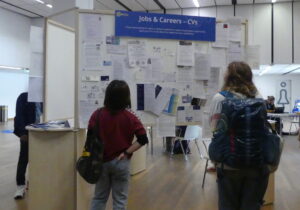 In the entrance foyer to Hall X2 on the Purple level are the Jobs and Careers boards in the Job spot, where you can post your CV, or find opportunities for training, networking or even employment. EGU25 also has a range of Pop-up networking events that you can organise during the week yourself, not limited to the Conference center. Want to host a session on CV writing for hydrologists in the Donaupark in the sunshine? Why not! Make sure you check back regularly throughout the week for updates.
In the entrance foyer to Hall X2 on the Purple level are the Jobs and Careers boards in the Job spot, where you can post your CV, or find opportunities for training, networking or even employment. EGU25 also has a range of Pop-up networking events that you can organise during the week yourself, not limited to the Conference center. Want to host a session on CV writing for hydrologists in the Donaupark in the sunshine? Why not! Make sure you check back regularly throughout the week for updates.
Around the conference center there are several other resources you can use, from private interview rooms (Purple level -2.81 and -2.63, ask at the Info booth for help), the EGU Networking Zone (Red level, suite C, room 2.79) and a Business Lounge (Yellow Level to the left hand side after the entrance).
Meet exhibitors and experts
EGU25 has over 50 exhibitors attending the conference, from publishing houses to instrument developers, research institutes to consultancies. Find out who will be attending and what special sessions or talks they may be running by checking out the List of Exhibitors and the list of specific Pop-up Exhibitor Events. The exhibition is located in the entrance hall on the Yellow level, directly above the entrance on the Green level and in Hall X2 on the Purple level.
Exhibitors will be present during opening hours:
- Monday, 28 April to Thursday, 1 May 2025: daily from 10:00 to 18:00
- Friday, 2 May 2025: 10:00–13:00.
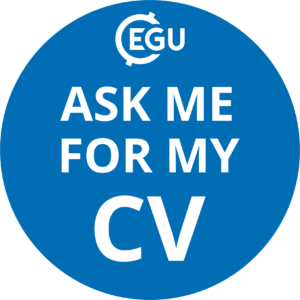 Show you’re open to new opportunities
Show you’re open to new opportunities
Regardless of whether you attend EGU25 on-site or virtually, your Copernicus profile offers the possibility to show you are in the market for a new job through the “Ask Me For My CV” sticker. Just enter the “My profile” section of the EGU25 homepage, click “Edit stickers” and enable the sticker via the toggle button!
Other resources
Don’t forget EGU has a range of resources on hand to help you with your career development year round. From tips on how to write a great CV from the ECS groups to Division and Union Level blog posts on a range of careers topics. We even have webinars for you to watch in preparation for the event on our YouTube channel.

